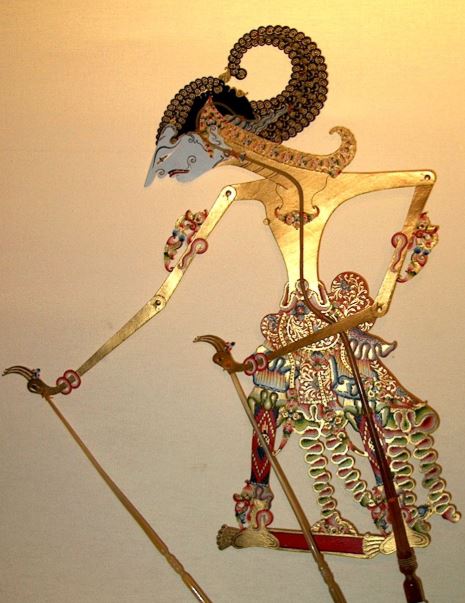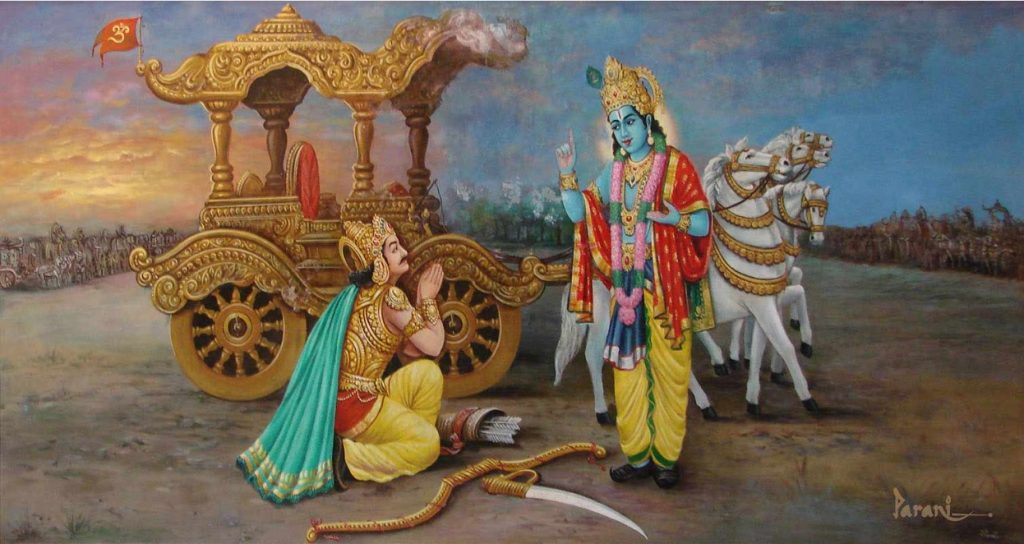This is Part 7 of Bhagavad Gita Weekly series. We will continue with chapter 2, verses 6 to 10. You can read the last part here and the earlier parts here…
In the previous post, we looked at chapter 2, verses 1 to 5 where Lord Krishna asked Arjuna how did all those impurities have come upon him, that he became so delusional about his Dharma as a Kshatriya warrior.
Lord said to Arjuna that whatever the reasons be, Arjuna, none of those emotions that you experience now are out of compassion, but it only shows the weakness of your heart. Addressing Arjuna as Partha, reminding him of the honor and greatness of the family he belongs to, Lord Krishna said that it does not befit your stature as a warrior, neither does it attain you swarg-lok nor any fame. Thus, give up this petty weakness of your heart and arise!
We stopped at where Arjuna told Lord Krishna, that it would be better for him to live by begging than killing his gurus and grandfather who are highly worthy of worship. There is no point in living to enjoy whatever that is gained as they will all be tainted with the blood of his kith and kin if they’re to be killed.
Let us now continue from chapter 2, verses 6 to 10.
If you have not read the earlier parts yet, please check them out and share it with your friends as well! Please also Like the Facebook Page to stay up to date with the posts here.
Jump to the Commentary for Chapter 2, verses 1 to 5
Commentary for Chapter 2, verses 6 to 10
We have already looked at the chapter 1 of the Gita where Sanjaya explained to his King, Dhritarashtra what was happening at the Kurukshetra battlefield. In the last part of this series, we looked at Lord Krishna telling Arjuna to give up his petty weakness of the heart and to arise.
Arjuna continued to reason to Lord Krishna with his arguments as he was overwhelmed with compassion for his gurus and grandfather, Bhishma, who he considers as worthy of his worship. Arjuna could not even imagine talking back to these great people, let alone fighting with them and eventually having to kill them! He said, “I would rather live by begging than killing the noble souls…”
Arjuna continued, finally realizing that he is confused and fully surrendering to Lord Krishna, “I am confused about my duty, and have lost all my composure due to my miserliness (fainthearted). I am your disciple, and am surrendered to you. Please instruct me for certain what is best for me.”

As we know, first step in finding solutions to any of our problem is to genuinely acknowledge that there is a problem. Here, Arjuna finally realises that his ability to differentiate between what is right and wrong has been subdued by overwhelming emotions and compassion for his kith and kin. His delusion was not due to his compassion for the entire Kauravas, but for his dear grandfather and his gurus like Dronacharya. If Lord Krishna had brought the chariot to where Duryodhana was standing, the war would have broken out then and there. But Arjuna would have gone through the same delusion right in the middle of the war when he discovers that Bhishma and Drona, are too fighting alongside the Kauravas.
Lord Krishna, the all knowing Supreme God (Janardhana – the one who always removes the ignorance of His devotees), did not want this to happen that might jeopardize the victory of Dharma. Thus, Lord purposely brought the chariot to where Bhishma and Drona were standing to fight, thus preparing Arjuna to have the right mindset much before this huge war begins.
Arjuna was just a nimitta (cause / reason). Lord Krishna shared the Gita for the whole world, through Arjuna, being his dearest disciple, a friend and his own cousin.
Arjuna said to Lord Krishna,
“kārpaṇya-doṣopahata-svabhāvaḥ
pṛcchāmi tvāth dharma-sammūḍha-cetāḥ”
“Kārpaṇya-doṣha” means, “the flow of cowardice or miserliness”. Arjuna says that, he was absolutely confused after seeing Bhishma and Dronacharya at the battlefield ready to fight him. He now realises that, all the emotions and compassion that he was feeling which caused him to be delusional arose from his miserliness – that the feeling of “MY grandfather, MY guru, the fear of ME committing the sin, etc.” He was only concerned about what He was feeling forgetting the fact that his duty is to defend Dharma, regardless of what it costs. His miserliness, as he realises now, is due to his ignorance of his true identity and his vast spiritual knowledge, though it was arose from him being overwhelmed by emotions.
Assuming if Arjuna had thought about only his need for compassion to his grandfather, gurus, and kith and kin, and his fear of committing sins, what would have happened in the Kurukshetra?
We know the story of Bhishma and Dronacharya. Bhishma was bound by his vow that his allegiance will remain with the throne regardless of who sits on the throne. Similarly, Dronacharya was duty-bound to serve Hastinapura being the Rajaguru and various other commitments. They both were bound by their duties and vows, making them hapless spectators in this great tragedy that led to this war. If not for their vow and their unmatched commitments to their words, Mahabharata would have been very different, isn’t it? Bhishma would not have ever allowed Draupadi to be disrobed in the court, if he wasn’t bound by his vow. However, was that the right thing to do, was that the ultimate Dharmic act..? It is something for us to ponder upon to understand what Dharma truly is..!
“Dharmo Rakshati Rakshitah” is what the Vedic scriptures say. Dharma protects those who upholds / protects Dharma.
Realising that Arjuna was confused by being overwhelmed with emotions, he now decides to surrender fully to Lord Krishna, and ask him for guidance, for there is no one that could match to give guidance to his devotee and disciple than Lord Krishna himself!
“śhiṣhyaste ’haṁ śhādhi māṁ tvāṁ prapannam” – “I am your disciple, please instruct me what is best for me, and I surrender to you fully…”, said Arjuna.
True knowledge about the Absolute Truth, the Brahman, can only be attained when we surrender ourselves to our spiritual Guru. As we know, it is extremely difficult to unlearn things than learn new things. Whatever we may have learnt before must be unlearned in order for us to re-learn.
Bhagavatam says (11.3.21);
“tasmād guruṁ prapadyeta
jijñāsuḥ śreya uttamam
śābde pare ca niṣṇātaṁ
brahmaṇy upaśamāśrayam”
“Seekers of the Truth should surrender themselves to a Spiritual Master who has understood the conclusion of the scriptures and taken complete shelter of God, leaving aside all material considerations.”
Arjuna fully understands this. That’s why he decides to surrender to his Master, his friend, his beloved Krishna for guidance, for now he realises that he has been overpowered by kārpaṇya doṣha – the cowardice of his heart / the miserliness.
From all the reasons and arguments that Arjuna put forth in whole of chapter 1 and earlier few verses in chapter 2, it is amply clear how spiritually advanced Arjuna is. However, he has the wisdom to acknowledge that,
“na hi prapaśyāmi mamāpanudyād yac
chokam ucchoṣaṇam indriyāṇām
avāpya bhūmāv asapatnam ṛddhaṁ
rājyaṁ surāṇām api cādhipatyam”
That, he is unable to find any means to drive away this anguish that is completely drying up his senses, causing him to be overpowered by kārpaṇya doṣha, and clouding his intellect that would allow him to differentiate between what is right and wrong, and what is dharmic and adharmic.
Then he goes ahead and says, “even if I was given the rulership of whole earth, similar to that of the power of demigods, even that would not help me dispel the grief I am experiencing now…”, clearly stating that, Arjuna is not at all interested in any of these material possessions and that he wants to realise the Supreme Truth that only Lord Krishna could guide him to. That he wants to know what the purpose of his life is.

Arjuna is not alone in this situation. We all have experienced miseries and sufferings in life, phases in life where we became completely hopeless and almost gave up. There were times, we felt that nothing seemed to be working out, it could be issues with family, or issues at work, love, relationship or money…our knowledge becomes so limited to find solutions to any of these unavoidable puzzles in life. The only things that would help us solve these puzzles are spiritual guidance and divine knowledge, to help us dive deeper into ourselves for answers than surrendering to our miseries and calling it “fate”. Spiritual advancement only happens when we have the humility to accept and unlearn whatever we learnt, rewiring our thought processes and finding a true guru who is transcendental to guide us. Some of us would find that guru in our own being, or even in gurus who have already passed on to the other realm. It does not matter. Complete surrender with the intention to attain right knowledge – knowledge of the Self – is what matters.
In this case, Arjuna decides to do just that, to surrender to the Supreme Lord, for he realises that whatever knowledge he has acquired this far has become futile in finding him solutions to his current suffering and delusion.
Sanjaya then continued to update to his King, Dhritarashtra, and said,
“evam uktvā hṛṣīkeśaṁ
guḍākeśaḥ paran-tapaḥ
na yotsya iti govindam
uktvā tūṣṇīṁ babhūva ha”
Having thus spoken, Gudakesha, the chastiser of enemies, addressed Lord Krishna: “Govinda, I shall not fight” and became silent.
Hearing this from Sanjaya must have made Dhritarashtra very happy thinking that Arjuna has given up fighting and has decided to choose begging instead. But what Arjuna did was to completely surrender to the Lord, to be instructed as to what is best for him, that to help him through his sorrow by teaching him the eternal knowledge of self realisation. Sanjaya with his divine vision must have been able to know what was really happening, thus using apt names for both Arjuna and Lord Krishna in this verse!
Arjuna is addressed here as Gudakesha by Sanjaya again, meaning, the one who has overcome sleep and is constantly alert or the one who has overcome darkness / ignorance or the one who is spiritually awaken. Sanjaya also calls Arjuna, Parantapa – the chastiser of enemies – fully acknowledging how capable and strong Arjuna is.
Sanjaya addresses Lord Krishna as Hrishikesha, meaning the one who is the master of minds and senses, signifying that the Lord knows exactly what is happening to his favorite devotee and his disciple, Arjuna.
In the 10th verse, Sanjaya says, “O Dhritarashtra, thereafter, standing in the midst of both armies, smilingly Krishna spoke this to Arjuna…”
Instead of getting despair to Arjuna’s lamentation, Lord Krishna smiled, as if he was perfectly happy with the way things were going. One of the first criterias to be a disciple is to surrender unconditionally to the Guru. Here, Arjuna has decided to completely surrender to Lord Krishna, fully acknowledging that, he no longer knew what was right for him, and that he knows no one else than Lord Krishna would be able to help him through this situation and to teach him the knowledge that would help him through his sorrow.
We will come to what Lord Krishna spoke to his disciple smilingly in the next part.
ॐ पूर्णमदः पूर्णमिदं पूर्णात्पुर्णमुदच्यते
पूर्णस्य पूर्णमादाय पूर्णमेवावशिष्यते ॥
ॐ शान्तिः शान्तिः शान्तिः ॥
Om Puurnnam-Adah Puurnnam-Idam Puurnnaat-Purnnam-Udacyate
Puurnnasya Puurnnam-Aadaaya Puurnnam-Eva-Avashissyate ||
Om Shaantih Shaantih Shaantih ||
My Pranams.
Please check out the previous parts in this series and share it with your friends as well! Please also Like the Facebook Page to stay up to date with the posts here.
